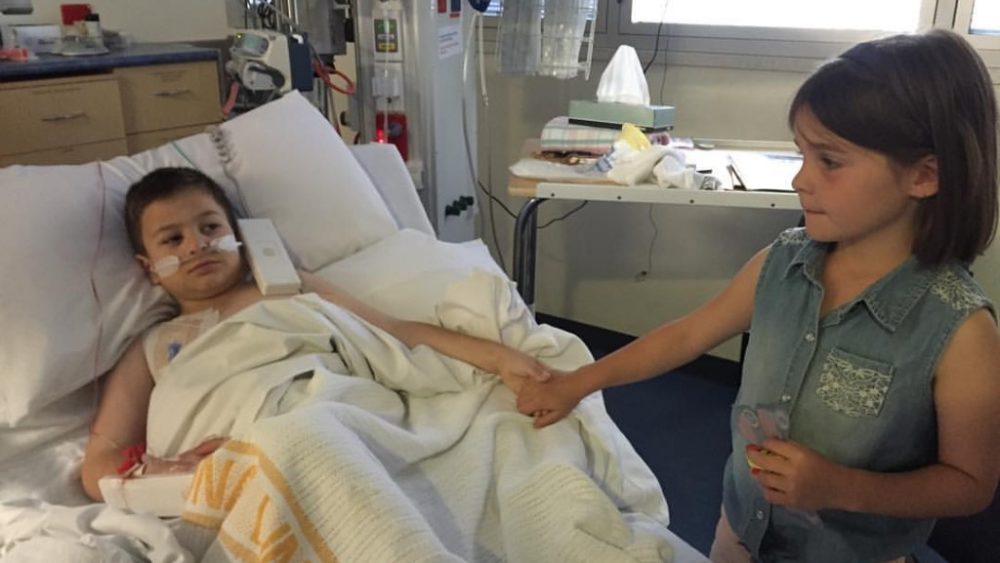When Pastor Brad Chilcott gave an emotional speech to the ALP conference this week about the value of Medicare, it brought back memories of a miraculous life-giving gift.
Lead pastor at Activate Church in Adelaide, Chilcott donated a kidney to his then eight-year-old son, Harrison, in twin operations on December 6, 2015.
“It’s no exaggeration to say that our son Harrison would not be alive today without Labor’s creation and protection of Medicare and the Pharmaceutical Benefits Scheme,” Brad posted this week on Facebook. “While we worry about what’s next for his health, we never have to worry about affording the care he needs.”
Chilcott is also director of Welcome to Australia, a national movement cultivating a culture of welcome for people seeking asylum, refugees and other new arrivals to Australia.
Father and son endured a dark couple of weeks of severe pain after the transplant operations.
“Harrison made a really bad recovery and was in intensive care for eight days,” Chilcott told Eternity a few weeks after Harrison’s operations. But when Harrison started to recover, he made a cheeky remark that made his father crack up.
Lying on his hospital bed, he said: “Dad, I reckon the Bible should be rated R or M because of all the violence and Genesis should at least be PG for mild nudity.”
It was Harrison’s coining of the phrase “mild nudity” that prompted a wave of hilarity for Chilcott – and a welcome respite from a painful period of their lives.
Harrison is Brad and Rachel Chilcott’s miracle child. When Rachel was 18 weeks pregnant, the couple were told that amniotic fluid was trapped in the baby’s bladder, stunting foetal growth. They were advised to terminate because the baby would die soon after birth from kidney or respiratory failure. But they decided to give Harrison every possible chance at life.
“It seems like he knows that every day is a bonus and a blessing that wasn’t expected.” – Brad Chilcott
“We wanted to be able to say ‘We gave God every opportunity to do his thing and we gave Harrison every opportunity to be alive’ and to not look back the rest of our lives wondering ‘what if?’”
“We don’t want to look back on this period and wish that we had given every chance to natural causes.
“He knows that we were told that he wouldn’t survive even for a day, that when we took him home from hospital that they still didn’t think that he would survive. It seems like he knows that every day is a bonus and a blessing that wasn’t expected.”
Harrison was born on 25 June 2007 with only 15 per cent kidney function. Doctors warned that he would need eventually a kidney transplant.
“Every year they said this will be the year when he needs dialysis or a transplant, but every time we heard that we took it with a grain of salt,” Chilcott said.
But when Harrison’s blood tests deteriorated significantly in 2015, dialysis began. Five months later, the surgery took place.
After his discharge from hospital, it took doctors a few months to get the right cocktail of drugs to ensure the kidney was not rejected. Harrison also had to have weekly tests of tacro and creatinine levels to gauge the kidney’s functionality.
Once a drug regime is established, a kidney transplant is expected to last an average of 15 to 20 years.
“I’m so lucky that my mum is also a match, so when my dad’s kidney fails one day, I’ll steal Mum’s.” – Harrison Chilcott
“Before my dad gave me a kidney, I couldn’t eat chocolate and I was on dialysis for five months,” Harrison wrote on Kidney Health Australia‘s website, three months after his transplant.
“It was every kid’s nightmare. I knew my kidneys weren’t working properly from when I was born, but some people have kidney disease and they don’t even know it. Also, I was lucky my dad was a match. Some people have to wait up to three or more years for a match.
“I’m so lucky that my mum is also a match, so when my dad’s kidney fails one day, I’ll steal Mum’s.
“It’s very important to check your kidney health so you can keep eating chocolate and not go on dialysis. And maybe one day, your kidney can help someone like my dad’s helped me.”


